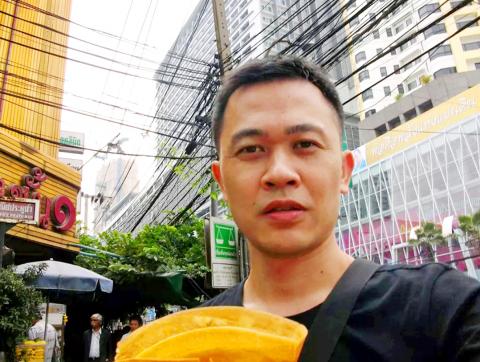Foreign media have lauded pilot Liao Chien-tsung (廖建宗) for his courageous endeavors in the final moments of TransAsia Airways Flight GE235, steering away from buildings to avoid further casualties, while comments from former pilots appear to confirm rumors that Liao told the company that there was a problem with the engines.
Flight GE235 bound for Kinmen crashed into the Keelung River on Wednesday morning about 5km out of Taipei International Airport (Songshan airport).
There were 53 passengers and 5 crew members on board.

Screen grab from Liao Chien-tsung’s Facebook account
At least 31 of the passengers have been confirmed dead and rescuers continue to scour the river for the remaining 12 passengers.
A total of 15 passengers survived, most with injuries,, while two passengers in a taxi that was hit on the bridge by the plane sustained minor injuries.
Hong Kong-based aviation analyst Daniel Tsang said: “Based on the flight path, the pilot deviated and tried to avoid obstacles. The pilot apparently made a conscious effort to avoid further and unnecessary casualties by ditching in the river. It was a very courageous move.”
Former aviation safety inspector at the US Federal Aviation Administration (FAA) David Soucie said: “Well I’ve gone through each of them [the dash-cam videos] frame by frame and as you can see … it goes out of sync meaning that the left propeller lost power ... so this movement to the left was intentional by the pilot to avoid the buildings … and to make an attempt to reduce fatalities by trying to get it onto the water and miss the obstructing bridge.”
One source said that most pilots were “trained to just continue straight, it’s the best lift and the engine will allow you to continue to travel” if they suffer a flame-out of an engine during a critical phase of flight, adding that Liao had “made that decision, a conscious decision” to steer the plane into the river.
Former US Department of Transportation Inspector General Mary Schiavo said: “He was pretty close to actually saving many more … here they would have probably made it, and many more would have survived, if that wing hadn’t dropped and they hadn’t scraped the wing.”
“Statistically speaking, just an outrageously bad safety record,” Schiavo said referring to TransAsia’s safety record, which has suffered five crashes since 1995, including TransAsia Airways Flight GE222 which crashed in Penghu in July last year, killing 48 people of the 58 on board.
Many former pilots of the ATR72-600 series said that it was possible to fly and land the plane using a single engine, which suggests a faulty engine was to blame.
Meanwhile, former Civil Aeronautics Administraton director-general Billy Chang (張國政) said that the pilot’s actions had sought to minimize damages to the ground, especially as the plane was above a densely populated region.
Taipei Mayor Ko Wen-je (柯文哲) also said that the pilot had done his best, adding that the plane crashed 50m before a utility tower holding high voltage lines, which could have caused a major blackout in Taipei.

An essay competition jointly organized by a local writing society and a publisher affiliated with the Chinese Communist Party (CCP) might have contravened the Act Governing Relations Between the People of the Taiwan Area and the Mainland Area (臺灣地區與大陸地區人民關係條例), the Mainland Affairs Council (MAC) said on Thursday. “In this case, the partner organization is clearly an agency under the CCP’s Fujian Provincial Committee,” MAC Deputy Minister and spokesperson Liang Wen-chieh (梁文傑) said at a news briefing in Taipei. “It also involves bringing Taiwanese students to China with all-expenses-paid arrangements to attend award ceremonies and camps,” Liang said. Those two “characteristics” are typically sufficient

A magnitude 5.9 earthquake that struck about 33km off the coast of Hualien City was the "main shock" in a series of quakes in the area, with aftershocks expected over the next three days, the Central Weather Administration (CWA) said yesterday. Prior to the magnitude 5.9 quake shaking most of Taiwan at 6:53pm yesterday, six other earthquakes stronger than a magnitude of 4, starting with a magnitude 5.5 quake at 6:09pm, occurred in the area. CWA Seismological Center Director Wu Chien-fu (吳健富) confirmed that the quakes were all part of the same series and that the magnitude 5.5 temblor was

The brilliant blue waters, thick foliage and bucolic atmosphere on this seemingly idyllic archipelago deep in the Pacific Ocean belie the key role it now plays in a titanic geopolitical struggle. Palau is again on the front line as China, and the US and its allies prepare their forces in an intensifying contest for control over the Asia-Pacific region. The democratic nation of just 17,000 people hosts US-controlled airstrips and soon-to-be-completed radar installations that the US military describes as “critical” to monitoring vast swathes of water and airspace. It is also a key piece of the second island chain, a string of

The Central Weather Administration has issued a heat alert for southeastern Taiwan, warning of temperatures as high as 36°C today, while alerting some coastal areas of strong winds later in the day. Kaohsiung’s Neimen District (內門) and Pingtung County’s Neipu Township (內埔) are under an orange heat alert, which warns of temperatures as high as 36°C for three consecutive days, the CWA said, citing southwest winds. The heat would also extend to Tainan’s Nansi (楠西) and Yujing (玉井) districts, as well as Pingtung’s Gaoshu (高樹), Yanpu (鹽埔) and Majia (瑪家) townships, it said, forecasting highs of up to 36°C in those areas